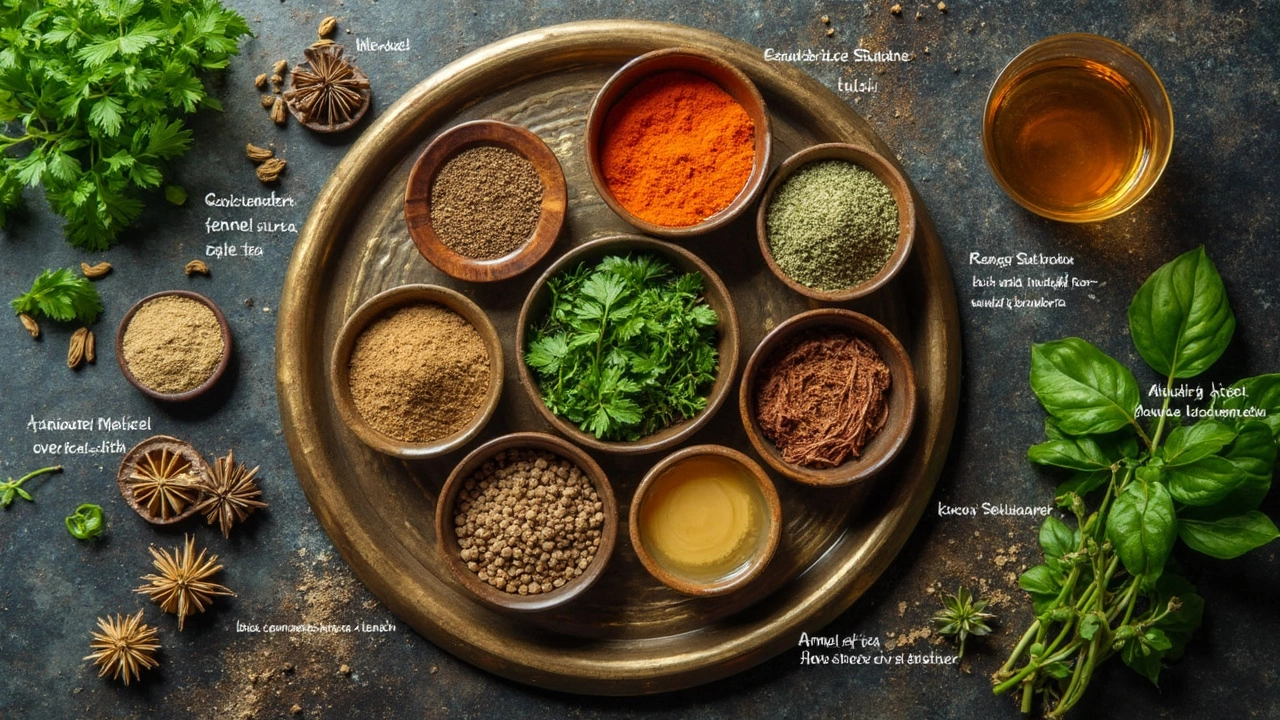-
24

Best Herbs to Take Daily: Benefits, Science, and Practical Tips
Picture this: you wake up, grab your water, take your daily herb, and somehow your body's already thanking you by breakfast. There's a reason so many cultures turn to plants for their daily boost, whether it’s a cup of holy basil in India or a sprinkle of oregano in Greece. The hunt for the single "best" herb to take every day might sound simple, but honestly, it’s a loaded question. The answer depends on what you want—energy, immunity, calmer nerves, or better digestion. Still, a handful of herbs have earned serious attention worldwide for their wide-ranging benefits and safety for most people when used daily.
Herbs That Stand Out For Daily Use
Different people have different routines, but some herbs make it easy to see why they've become favorites for daily use. Let’s talk about a few heavy-hitters most backed by science and history: ashwagandha, turmeric, and holy basil. These herbs don’t just have big traditional reputations; they keep showing up in clinical trials and nutritional studies with results that are pretty hard to ignore.
Let’s start with ashwagandha. This adaptogen—meaning it helps your body handle stress—has roots in Ayurvedic medicine for over 3,000 years. A 2022 clinical trial out of India (with 150 participants) showed people taking daily ashwagandha extract had lower cortisol and reported sleeping better after 8 weeks. It packs withanolides, natural compounds that seem to lower anxiety, boost stamina, and support immunity. You’ll often find ashwagandha in capsules, powders, or tonics. If you chase focus and calm, ashwagandha gets you there naturally.
Next up, turmeric. If you’ve seen those bright golden curries, you already know turmeric brings flavor and color, but its health impact is where it really shines. The active compound, curcumin, isn’t just an old wives’ tale—there’s a pile of studies proving curcumin helps combat chronic inflammation, supports muscle recovery, and even protects brain health. In a 2023 meta-analysis of 12 studies, daily turmeric supplements lowered markers of inflammation by nearly 25%. Want to get more out of it? You'll see folks pairing turmeric with black pepper, which helps your gut absorb the beneficial curcumin by about 2,000%—that’s not a typo. Whether you put turmeric in your smoothie or stew, it’s worth a place in your routine.
Holy basil, or tulsi, has its own magic. Best known in Indian households for boosting immunity and calming frazzled nerves, this herb is rich in antioxidants that protect your cells from everyday stress. A 2021 study on healthcare workers in Asia found those sipping on tulsi tea daily called in sick about 25% less often during cold and flu season. You can drink tulsi as a tea, add leaves to salad, or even find it in essential oil blends.
But what about safety? For the average healthy adult, these herbs are safe in normal food-like doses—think a teaspoon of powder or a few cups of herbal tea a day. Taking massive, concentrated amounts might backfire, especially if you’re pregnant or on certain medications. If your goal is to add a gentle, steady support every day, these classic herbs keep it low risk and high reward. Here’s a quick comparison so you can see what stands out for you:
| Herb | Main Benefit | Ideal Dosage | Common Form | Notable Caution |
|---|---|---|---|---|
| Best daily herb (Ashwagandha) | Stress, sleep, stamina | 300-600 mg/day | Capsule, powder | Possible drowsiness |
| Turmeric | Anti-inflammatory, joint health | 500-1000 mg/day | Powder, capsule | May thin blood |
| Holy Basil | Immunity, mood support | 2 g/day (tea or fresh leaves) | Tea, capsule, fresh | Mainly safe, possible blood thinning |

Everyday Benefits You’ll Actually Notice
This isn’t about vague promises or internet hype. When you use these herbs every day—and you actually stick with it—you may notice tangible changes. You could get through your day with more patience. Maybe you’re less reactive to stress at work, or those joint aches dial down a notch. In the case of turmeric, some athletes report easier post-workout recovery, which lines up with reductions in muscle soreness in several published gym studies.
The immune support part is real, too. People who use adaptogenic herbs like holy basil or ashwagandha long-term report getting fewer colds each year, and the science backs this up for some. Researchers at Harvard noted in 2020 that daily use of adaptogens like ashwagandha modulates immune function—meaning it helps your body's defenses balance out without overreacting, key if you get frequent colds or deal with allergies. Tulsi’s high eugenol content can fight off bacteria and viruses, making it an easy favorite for folks who want to skip sick days during flu season.
Mood and focus? Ashwagandha shines here. In a 2021 random-controlled trial with office workers, those taking 500 mg ashwagandha daily saw 22% reductions in stress and reported better focus after six weeks, compared to a placebo. For people with really high-pressure jobs, that’s a noticeable edge you’ll feel—less brain fog, more steady energy. Turmeric, meanwhile, gets attention from neuroscientists for its potential protective effects against memory loss. A UCLA study from 2018 found seniors drinking curcumin-rich beverages showed memory improvements over 18 months, and MRI scans even revealed less invisible brain plaque.
Digestion can also improve with daily herbs, especially for those with “loud” guts after meals (no shame, we’ve all been there). Turmeric’s anti-inflammatory punch has shown small but consistent improvements for people with bloating and mild irritable bowel symptoms. Holy basil might help out if you’re sensitive to stress-triggered stomach trouble—its calming effect on your system can keep the gut-brain connection working in your favor.
Here’s the kicker: the benefits build over time. You won’t feel superhuman overnight, but the changes stack up after a few weeks. You might wake up realizing your mood is steadier, your sniffles have gone MIA, and your post-run knees don’t protest as loudly. Think of these herbs as daily small investments for bigger payoffs down the road.

Smart Tips for Picking, Preparing, and Taking Herbs Daily
The best herb isn’t much use if you can’t fit it into your life, right? Here’s how to keep it smart, simple, and effective. Start with what matters most to you—stress, aches, immune support, or just daily energy. Then test one herb at a time for a full month. Resist the urge to blend everything together at first. This way, you get a clear sense of what actually works for you, not what looks good on paper.
Quality is a non-negotiable. Herbs are only potent if they’re fresh and pure. Buy from brands that show certification (like USDA Organic or third-party testing labels), not just pretty packaging. If possible, pick powders or extracts over crushed leaves—they’re usually more concentrated and consistent. For ashwagandha and turmeric, standardized extracts are a safe bet. Tulsi can be found fresh, in tea bags, or as capsules. If you’re old school, growing holy basil on your windowsill actually isn’t that hard, and it’ll give you the freshest leaves possible—plus, the plant looks awesome at home.
Preparation hacks save time. Toss turmeric into your eggs or overnight oats, or blend a half-teaspoon into your morning smoothie. For ashwagandha, find it in ready-to-drink lattes at health stores or just stir the powder into warm milk with a dash of honey. Tulsi tea is easiest—a few leaves in hot water, steeped for seven minutes (any less and you lose the flavor), and you’re good to go. Remember, black pepper boosts turmeric’s power, so always use them together. If you take capsules, try to do it with food to aid absorption—and to keep your stomach calm.
Here’s a pro tip: track your own results. Write down your energy, mood, sleep, and how you feel on the regular. This helps you decide if an herb is truly helping or just there for the placebo effect. Side effect wise, if you notice stomach upset, weird dreams, or allergies, either lower the dose or take a break. And yeah, always check with your doctor if you’re on medication, especially blood thinners, as some herbs can interact. Pregnant or breastfeeding folks should keep it to food-level herbs unless their doctor says otherwise.
A lot of people ask if you can rotate herbs or combine them. Sure—you can, once you know how you react to each on its own. For example, lots of folks take ashwagandha at night to wind down, then sip turmeric tea in the morning for joint comfort. Mixing tulsi and lemon balm is a popular combo for calming nerves during stressful weeks. Just don’t overload yourself with 5 different things at once; start easy, be consistent, and adjust as you go.
Herbs work best as part of a healthy, balanced life. Don’t expect ashwagandha to erase chronic sleep debt or turmeric to save your joints if you’re pounding soda all day. Think of herbs as your reliable support team—they make a good daily routine even better, not a replacement for good sleep, movement, and real food. So the next time you reach for that magic bottle, remember: the best herb isn’t always the rarest or most expensive, it’s the one you’ll actually take, every day, long enough to let the results stack up.